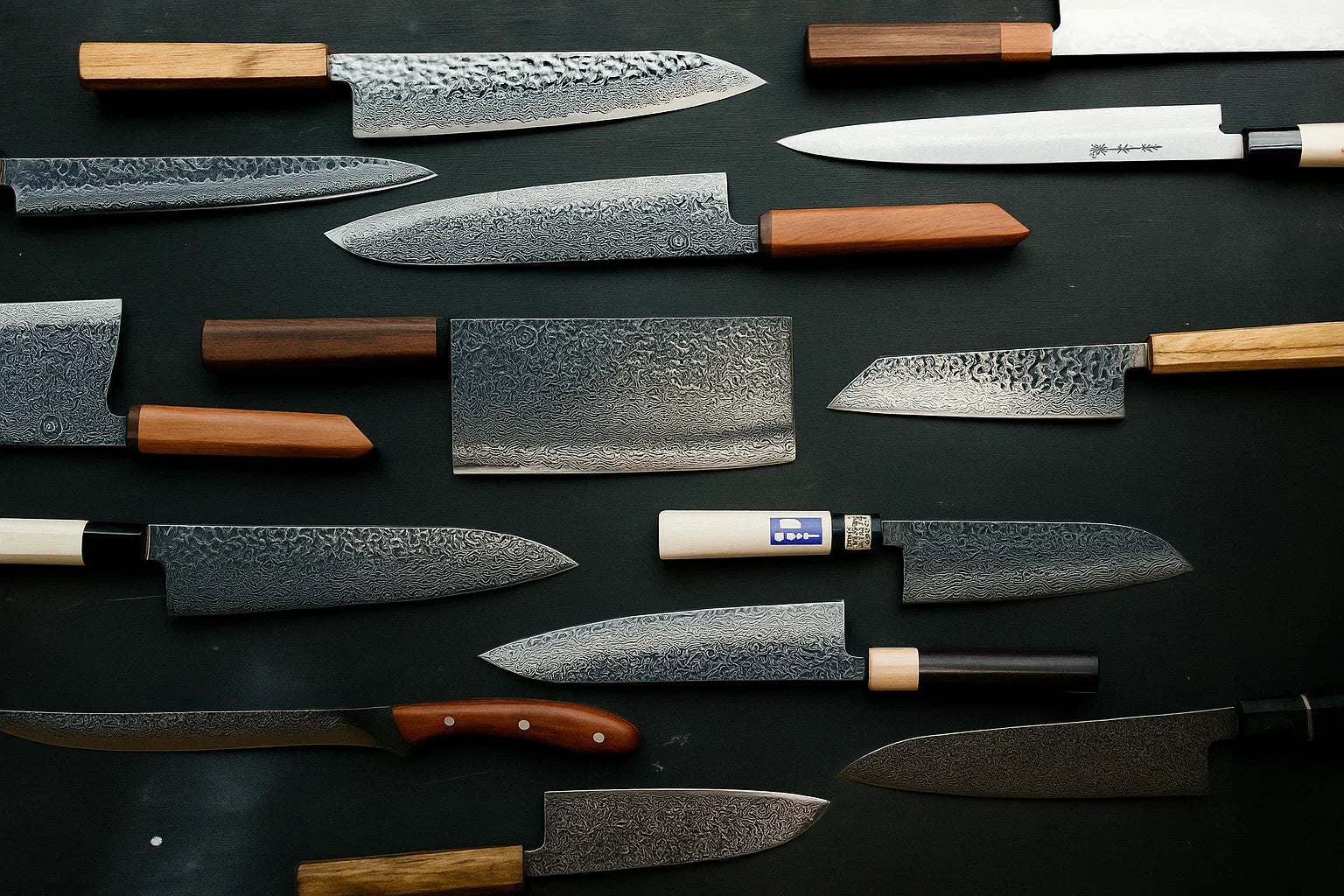Your Cart is Empty
FREE SHIPPING FOR USA

At Jun Knives, we believe a Damascus knife is more than a blade — it’s a fusion of art, heritage, and utility. While the hand-forged Damascus steel blade gets much of the spotlight, the handle is equally important. The right handle material enhances grip, comfort, control, and the visual identity of your knife.
In this definitive guide, we explore the most popular handle materials used in Damascus knives, their benefits, aesthetic appeal, maintenance tips, and how to choose the right one for your lifestyle — whether you’re a professional chef, collector, hunter, or everyday user.
The handle of a Damascus steel knife plays a functional and ergonomic role:
Enhances grip stability
Reduces hand fatigue during extended use
Improves cutting precision
Reflects personal style or tradition
Poor-quality handles can make even the finest blade uncomfortable or unsafe. At Jun Knives, we use premium, hand-selected materials to match the craftsmanship of our Damascus blades — combining durability, comfort, and design into every knife.
Below is a breakdown of the top handle materials we use, categorized by traditional, modern, and luxury preferences — each tailored to suit different users and purposes.
Pakkawood is a stabilized hardwood composite, combining the beauty of wood with the strength of synthetic resin. It’s highly favored for kitchen Damascus knives.
Benefits:
Moisture-resistant, ideal for food prep
Maintains natural wood grain aesthetic
Resists warping, splitting, and heat
Best For: Chefs, kitchen users, and collectors wanting durability with elegance.
Care Tips: Wipe clean after use; occasionally apply food-grade mineral oil to retain shine.
Tagayasan, known as “ironwood,” is a luxurious, ultra-dense wood from Southeast Asia. Its natural strength and grain variation make it a top-tier handle material.
Benefits:
Scratch-resistant and ultra-durable
Intricate, dark natural grain
Rare and collectible
Best For: Outdoor knives, heirloom blades, or collectors seeking maximum hardness and beauty.
Care Tips: Avoid moisture exposure. Oil monthly to maintain richness.
Walnut is a soft hardwood favored for its warm tones and natural luster. Lightweight yet strong, it offers a classic look with comfort.
Benefits:
Ergonomic and easy to grip
Renewable and eco-friendly
Deep, rich brown hues
Best For: Kitchen and everyday knives where style meets comfort.
Care Tips: Keep dry. Use wood conditioner or mineral oil regularly.
Micarta is a laminate made of fabric and resin, pressed under high pressure. It’s one of the toughest materials for tactical or survival Damascus knives.
Benefits:
Non-slip grip, even when wet
Handles extreme conditions
Lightweight yet strong
Best For: Hunting, bushcraft, and outdoor Damascus knives.
Care Tips: Clean with damp cloth. Oil to prevent drying over time.
Sourced from ethically shed deer or elk, antler handles bring an organic, rustic quality to Damascus knives — no two are alike.
Benefits:
One-of-a-kind texture and look
Lightweight and durable
Excellent grip from natural grooves
Best For: Gift knives, collectibles, or rustic-style outdoor tools.
Care Tips: Keep dry; oil to prevent cracking. Avoid soaking or excessive sunlight.
G10 is a modern, fiberglass-based laminate ideal for knives exposed to extreme environments. It’s often used in tactical and utility Damascus knives.
Benefits:
Water, oil, and chemical resistant
Grippy and strong in all conditions
Very low maintenance
Best For: Military-style, survival, and EDC Damascus knives.
Care Tips: Simply wipe clean. No oiling needed.
Bone handles offer a vintage appeal, often featured in collector’s Damascus knives or traditional folding knives.
Benefits:
Smooth, natural surface
Beautiful light tone and grain
Durable and symbolic of classic craftsmanship
Best For: Folding knives, display knives, and vintage-style collectors.
Care Tips: Keep dry. Oil occasionally to avoid brittleness or color fade.
Stabilized wood combines raw wood and resin for enhanced durability and aesthetics. Each piece is color-infused and unique.
Benefits:
Resistant to water, warping, and cracking
Vivid patterns and colors
Balanced between traditional wood and modern composites
Best For: Kitchen knives, high-end Damascus chef’s knives, and artistic collectors.
Care Tips: Dry after use and oil every few months to retain vibrance.
Carbon fiber is a futuristic, high-tech material known for its incredible strength-to-weight ratio. Its matte, patterned surface adds a cutting-edge look to Damascus blades.
Benefits:
Nearly indestructible and featherlight
Weather and chemical-resistant
Distinctive visual texture
Best For: High-performance, modern-style Damascus knives.
Care Tips: Clean with a soft cloth; avoid harsh abrasives.
When choosing your Damascus knife, don’t overlook the handle. The right handle material will depend on:
Purpose (kitchen, outdoor, EDC, collectible)
Grip preference (smooth, textured, contoured)
Design appeal (classic, rustic, modern)
Maintenance level (low vs. high care)
At Jun Knives, we match each hand-forged Damascus blade with a handle that complements its strength and soul. Whether you love the vintage charm of bone and antler, the modern resilience of G10 and carbon fiber, or the traditional warmth of walnut or pakkawood, there’s a perfect handle for every style and use.